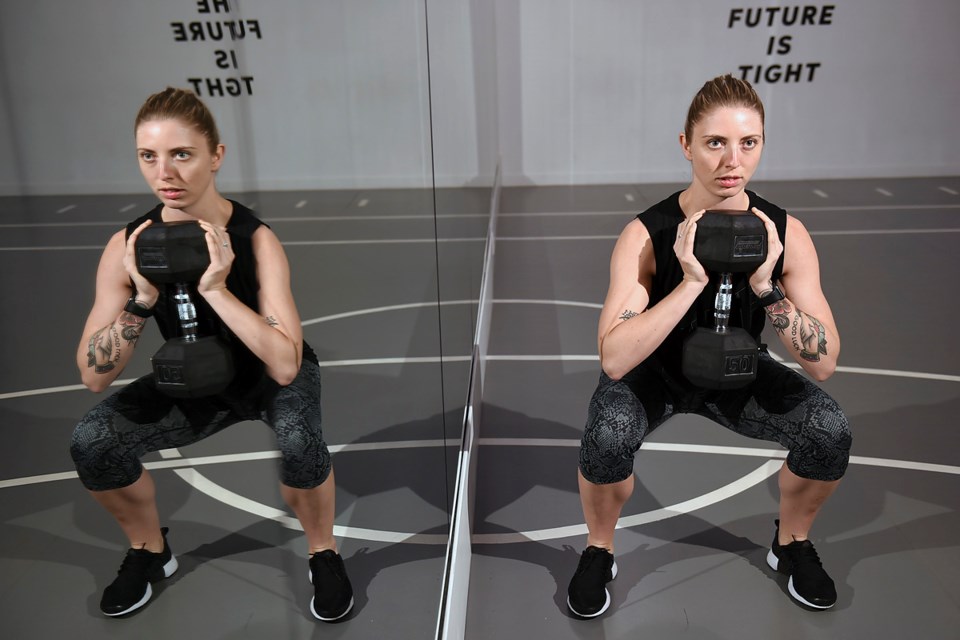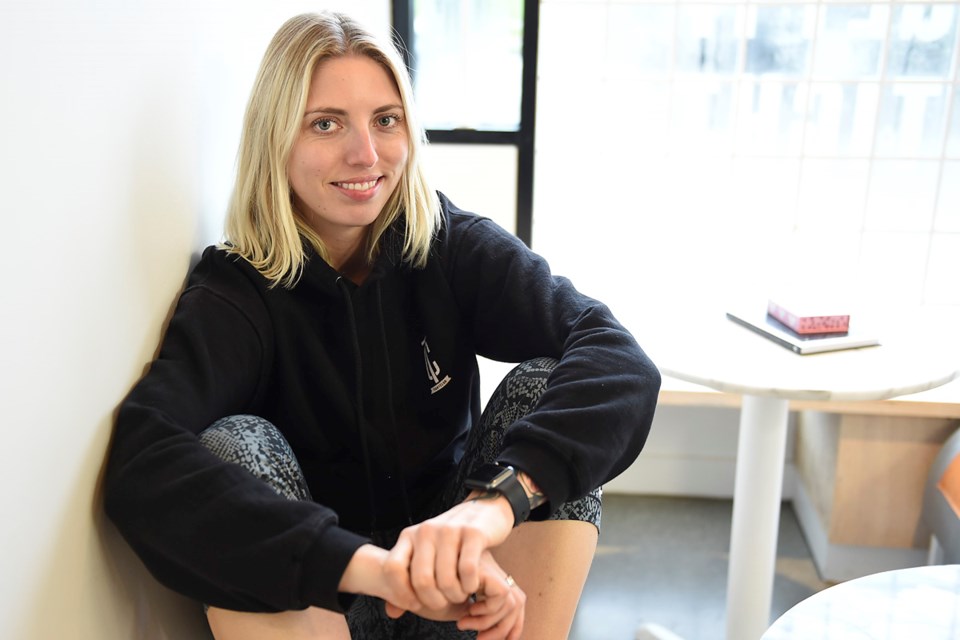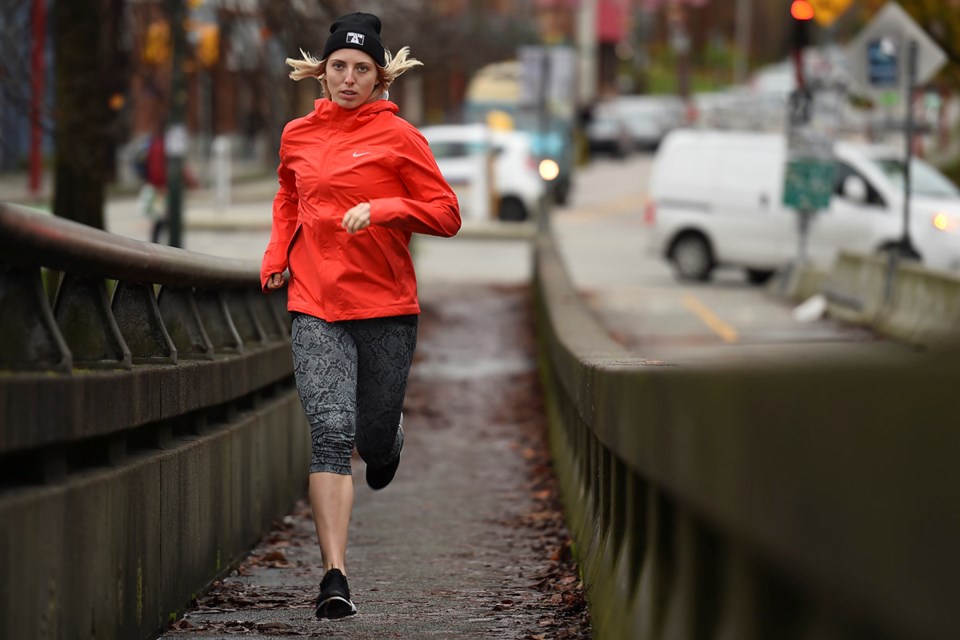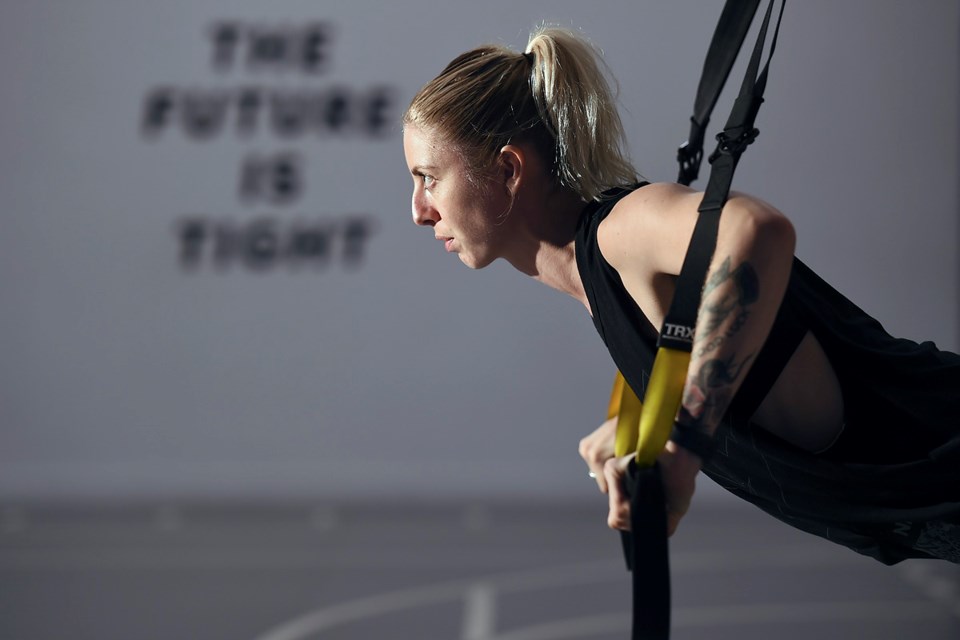Lace up your sneakers and tighten your bra strap for a new fitness trend in town. It’s not what you think. It’s community.
A movement more grounded than a mini-trampoline with more sincerity than super foods, this is one trend that could have staying power because it runs deep and is hard to fake, believes entrepreneur and personal trainer Keighty Gallagher, the founder of Tight Club, an outside-the-box boutique studio in Strathcona.
Next month, Tight Club celebrates the first anniversary of its Union Street studio, called the Field House.
“I’ve seen the overall industry move into a really good place,” she said Tuesday from a work retreat in Tofino. “From studios to clothing brands, everything is about connection and love, especially the political landscape right now, coming together as one is a theme and I see that showing through in the fitness industry, Community is the big buzzword that everyone is speaking to. However, it is a buzzword, and you can’t just say you have community. It’s something that has to come naturally and you know it when you have it.”

Gallagher has it. She built it with Tight Club, now a boutique fitness space on the edge of Strathcona that got its start three years ago as once-a-week boot camp-cum-urban scramble with neighbours, friends, bartenders and creatives tied to Gallagher who was serving at the Alibi Room after a recent move to Vancouver. Her goal was simple and, at the time, she hadn’t yet envisioned all the possibilities to come.
Grade ‘A’ is for booty
“Originally, Tight Club was never supposed to be centred around fitness. It was really supposed to be a driver to get people together and interacting again through movement, kind of like in gym class,” said the 28-year-old who still takes clients as a personal trainer.
Long before she first hosted one of those session at Andy Livingston Park, Gallagher, a junior national heptathlete for Canada, had been cementing the foundation of her own exercise philosophy.
One cornerstone, as she said, was the best of P.E. class, that sensation of inclusion, team work, healthy competition and personal development but never the anxiety that comes with being picked last or picked upon. Another brick was the enjoyment of creative play. Finally, a third building block was her network, one that include the type of person who can buy into Gallagher’s zombie apocalypse narrative, for example, as a motivational tactic to do more squats. What good is physical literacy and rock-hard thighs if you can’t use those things to outrun the walking dead?
“You’re never really getting fit for the gym. Whatever we’re doing in the studio, it needs to translate into real life,” said Gallagher.
She tells this to newcomers and fans of the much-loved class Booty Luv because the exercises will help with all-too-real activities and chores like climbing stairs, waiting in long lines, reaching top shelves and low ones, too. And also clubbing.
“I always say, this is not just a class to make your butt look good. It’s totally not about that, but this class will definitely make your butt look good because we will build strength and stability so you can dance in high heels on a slippery floor late at night.”
Needless to say, the soundtrack for Booty Luv features a lot of Beyoncé.

Big league burn out��
At 17, Gallagher was named the captain of Canada’s junior national athletics team for the 2005 World Youth Games in Morocco. She competed in the heptathlon, a track and field event with seven different disciplines such as the 100m hurdles, long jump and javelin that always follow the same order over two days of competition.
Gallagher’s best event was the high jump (“I’m a jumper at heart,” she said) but as a teenager she dreaded the final discipline, the 800m, considered the most technically challenging sprint and also the longest in athletics.
Gallagher said she loved training, socializing with her teammates, learning from her coaches and improving on her personal bests. She grew up on �鶹��ýӳ��Island and was a member of the Comox Valley Cougars Track and Field Club, where she described the atmosphere as having “super healthy ideals” since it emphasized body awareness and natural fluctuations in mood, energy and concentration.
“My coach always taught me not to rely on having a coach, but to focus on how I felt and not do certain things if my body didn’t feel that way,” she said. “It was such an amazing way to grow in a sport and go on to develop as an athlete.
“You were never treated as a number. It was not a business.”
But “shit got serious” and seriously unenjoyable after she committed to university sport in the U.S. Her ambition dried up during her first season as a varsity athlete at the prestigious NCAA Div. 1 track and field program at the University of Oregon. She was a triple jumper, but felt more like a faceless integer in a sum of points that added to overall team results, all which fed into a revenue-churning machine in the big marketplace of U.S. collegiate sport.
“I really hated the idea of being number on a team and a money-driver,” said Gallagher, who especially disliked the culture of fear and intimidation that prevailed. If a coach was having a bad day, the message from teammates was to "watch out."

"Over time, I associated the fitness aspect and the training element with fear," she said.
Avoiding that anxiety is one of the most important aspects she intends to offer at Tight Club.
Athletes: 'take an art class'��
All elite athletes face transition at the end of their competitive career, but Gallagher never expected hers to come so abruptly or with so much negativity. She transferred to a state college to study business and marketing in Portland and, along with her degree, earned some hard-fought lessons she can share with other athletes, all who face the same lifestyle changes to varying degrees.
“I say take your time with figuring out what you’re supposed to do and be ready for. Brace yourself for total and compete identity crisis,” she said. “For my own experience once I finished track, I was like, holy shit, what do I have?”
Many of her friends had a creative practice or pursuit, which inspired her and also hit home because she felt she had no such thing.
“What is my hobby? It used to be collecting cool track spikes and going to track practice and talking to other track nerds about their penultimate step.
“It took me a really long time to figure out what I was supposed to be doing,” said Gallagher, excitedly adding that she came closer to finding out what that was thanks to a pottery class with that, she said, “that changed my life.”
��
��
“I tell a lot of people this: take an art course,” said Gallagher. “Athletes are so ingrained in a specific type of lifestyle that the best thing to do is just get out there. Taking a class and doing something you normally wouldn’t do is a great way to meet people outside of your circle and they could be your best friend or the person who helps run your next project.”
The class opened up an aspect of Gallagher that was dormant. She also got incredibly lucky when another pottery student checked out her fit, athletic, tall body and recommend she model for lululemon. She had the valuable opportunity to see behind the curtain during a fashion shoot in Sri Lanka.
During this time, she also met her romantic partner, Henry Barros, a designer who encouraged and supported her creative expression. Together with her direction, they work on of Tight Club’s branding and clothing.
Her father, a retired dentist, also did all the fine wood finishes in the studio, including all the cabinetry and front desk. Not disappointing her parents was a deep motivator for Gallagher, who was partly motivated to put her business degree to work on their behalf. "A lot of people helped make this happen," she said.
The future is tight
Last December in the infancy of the Field House, which is the Union Street fitness studio and storefront for Tight Club, Gallagher was instructing more than two dozen classes each week. Unsurprisingly, this was unsustainable. But it forced the entrepreneur to rely on and trust the people she’d hired after two years of seeing through all the work on her own. As the business grew, so did its founder.
“Once we were actually live, it was me letting go a little bit and letting go of a little power. I remember our first two weeks, my trainers didn’t feel like they were ready to go live, so I taught every single class. I was like, on their third week, I said, pull it together I need help -- we’re a team now.
“Over the year, I have gone from teaching 25 classes a week and trying to run the business and marketing to now teaching about eight classes and taking on a few personal training clients and letting my staff and my team really own it and create a life for themselves inside Tight Club. That was the best part of being able to step back.”
She challenged herself to make each class engaging, exciting, use the freshest old and new tunes, and carve out a high-tempo, physically exacting niche, a proven success that keeps Tight Club classes filling up and waitlists growing longer each month.
��
��
She realized her ambition to offer a TRX class using the body-weight suspension bands and building a rig on which to hang them. Tight Club added cycling and swimming crews to its long-standing run club.
We started a women-only rad cycling team. That, honesetly, after last year, it was probably the thing that saved my life,” said Gallagher, a mind-like-a-diamond quipper who offers praise and swear words with ease.
There are no current plans to open a second location, she said. There is still room to expand within the Field House and through various urban exercise crews. But Gallagher is developing a workout that can incorporate the treasure trove of equipment and exercise tools already at the gym.
“I’m really interested in creating a circuit class that is very much our own,” she said, noting she wants to build consistency and innovation into the existing one.
“Every month is our best month,” she said. “We haven’t had a month yet that was less than the last.”
You know what that is. That’s tight.
Tight Club celebrates the first anniversary of its Field House studio with an open house from 2 to 6 p.m. Nov. 19 at 261 Union Street.
��
Twitter:



